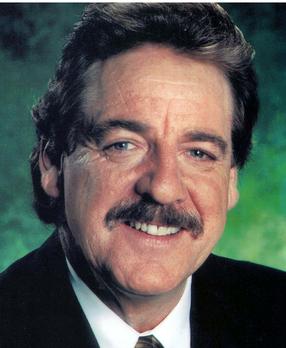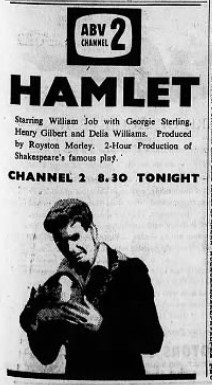Related Research Articles

Jack Thompson, AM is an Australian actor and a major figure of Australian cinema, particularly Australian New Wave. He is best known for his role as a lead actor in several acclaimed Australian films, including such classics as The Club (1980), Sunday Too Far Away (1975), The Man from Snowy River (1982) and Petersen (1974). He won Cannes and AFI acting awards for the latter film.

Mr. Squiggle is an Australian children's television series, and the name of the title character from that ABC show. The show was presented on television in many formats, between its inception on 1 July 1959 and 1999, from five-minute slots to a one-and-a-half-hour variety show featuring other performers, and has had several name changes, originally airing as Mr. Squiggle and Friends. At its height, the program was one of the most popular children's programs in Australia and toured theatre and conventions, entertaining several generations who grew with the program. It became one of the longest-running children's programs on Australian television, despite originally only asked to fill a six week gap on the ABC's schedule.

Diana Dors was an English actress and singer.

Ronald Grant Taylor was an English-Australian actor best known as the abrasive General Henderson in the Gerry Anderson science fiction series UFO and for his lead role in Forty Thousand Horsemen (1940).

Ian Bruce Turpie, sometimes referred to as Turps, was an Australian performer, actor, pop singer and presenter. He was the host of the teen pop music TV show, The Go!! Show (1965–66) and various TV game shows, The Price Is Right, and Supermarket Sweep (1992–1994). As a TV actor he portrayed Keith Warne on Swift and Shift Couriers and Wazza and Narrator in Housos (2011). He was diagnosed with oesophageal cancer in 2011 and died the following year, aged 68.

Peter Charles Combe OAM is an Australian children's entertainer and musician. At the ARIA Music Awards he has won three ARIA Awards for Best Children's Album, for Toffee Apple (1988), Newspaper Mama (1989) and The Absolutely Very Best of Peter Combe Recorded in Concert (1992) and four additional nominations. His best-known tracks are "Toffee Apple", "Spaghetti Bolognaise", "Mr Clicketty Cane", "Juicy Juicy Green Grass" and "Newspaper Mama". His Christmas Album reached the ARIA Albums Chart top 50.
Bill Bain was an Australian television and film director.
William Percy Lipscomb was a British-born Hollywood playwright, screenwriter, producer and director. He died in London in 1958, aged 71.

Neva Carr Glyn or Neva Carr Glynn was an Australian stage, film and radio actress born in Melbourne to Arthur Benjamin Carr Glyn, a humorous baritone and stage manager born in Ireland, and Marie Carr Glyn, née Marie Dunoon Senior, an actress with the stage name "Marie Avis". She had one half-sister Gwendoline Arnold O'Neill and two half-brothers Sacheverill Arnold Mola and Rupert Arnold Mola. She was named "Neva" after a great-aunt, who was a contralto of some quality. Both spellings of her surname appear in print roughly equally and apparently arbitrarily.

George Marlow was an Australian theatrical entrepreneur born in London of Jewish extraction, noted for bringing melodrama and pantomime to Sydney audiences in the early 1900s. His name has been frequently mis-spelled as "George Marlowe".

Anne Solway Hegerty is an English professional quizzer and television personality. Since 2010, she has been a "chaser" on the ITV game show The Chase as "The Governess", and was a contestant on the 2018 series of the ITV reality show I'm a Celebrity...Get Me Out of Here!
Rex Rienits was an Australian writer of radio, films, plays and TV. He was a journalist before becoming one of the leading radio writers in Australia. He moved to England in 1949 and worked for a number of years there. He later returned to Australia and worked on early local TV drama.

Stormy Petrel is an early Australian television drama. A period drama, the 12-episode serial told the story of William Bligh and aired in 1960 on ABC. It was the first live TV serial from the ABC.
Swamp Creatures is a play by the Australian author Alan Seymour. He wrote it for radio, stage and TV. It was Seymour's first produced play.
The Little Woman is a 1961 Australian comedy TV play written by Patricia Hooker and broadcast on the ABC.
The Man Who Shot the Albatross is a play by Ray Lawler about the Rum Rebellion, first performed in 1971 and turned into a 1972 TV movie featuring the same cast.
Wuthering Heights is a 1959 Australian television play adapted from Emily Brontë's 1847 novel Wuthering Heights. It was directed by Alan Burke and based on a script by Nigel Kneale which had been adapted by the BBC in 1953 as a TV play starring Richard Todd. It was made at a time when Australian drama production was rare.

Hamlet is a 1959 Australian TV play starring William Job and produced by Royston Morley.
Christopher Muir was an Australian director and producer, notable for his work in TV in the 1950s and 1960s. In the 1980s he was head of ABC Television drama.
Everyman is a 1964 Australian television play. It screened on the ABC and was directed by Christopher Muir, who filmed the whole script.
References
- ↑ "T.V. HIGHLIGHTS". The Biz . New South Wales, Australia. 23 December 1959. p. 7. Retrieved 18 September 2020– via National Library of Australia.
- ↑ "The Story of Good Will". TV Times. 24 December 1959. p. 18.
- ↑ "No Ill Will at Christmas". The Australian Women's Weekly . Vol. 27, no. 30. Australia. 30 December 1959. p. 42. Retrieved 18 September 2020– via National Library of Australia.
- ↑ "TV Club's Stars in ABN Panto". Sydney Morning Herald. 21 December 1959. p. 15.